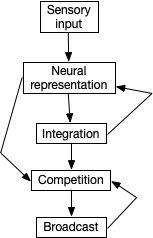Neuroscience
Regaining Consciousness
Explaining consciousness is hindered by five common mistakes.
Posted November 23, 2021 Reviewed by Gary Drevitch
Key points
- Understanding consciousness requires explanations of experience, awareness, attention, unity, and starts and stops.
- Understanding is blocked by the approaches of dualists, exaggerators, deniers, obscurers, and underraters.
- Neural mechanisms can explain consciousness of sensations, emotions, and cognitions.
The phrase “regaining consciousness” usually means recovering from unconscious states such as sleep and anesthesia. But I use it to mean rescuing consciousness from intellectual mistakes that impede scientific and philosophical understanding of a central aspect of human thinking. We need to regain consciousness from five approaches that block its explanation, pursued by dualists, exaggerators, deniers, obscurers, and underraters. Abandoning these opens the way for an understanding of consciousness based on neural mechanisms.
There is no standard definition of consciousness, but my 2019 book Brain-Mind analyzes it using exemplars (standard examples), typical features, and explanations.
Exemplars: External perceptions such as colors, internal perceptions such as pain, emotions, thoughts, and self-awareness.
Typical features: Experience, awareness, attention, starts/stops, and unity.
Explanations of: Behaviors, reports, and experiences.
A theory of consciousness has to apply to the full range of occurrences of consciousness, including sensation, emotion, and cognition. It should flesh out the explanations of experiences and behaviors by providing detailed mechanisms for awareness, attention, and other features of consciousness.
Consciousness is not just a side effect of thinking but contributes to intelligence in three ways, as described in my new book Bots and Beasts:
- Consciousness interrupts automatic processing to focus attention on factors relevant to making good decisions.
- Consciousness organizes inputs from different senses—for example the taste, smell, and texture of a banana.
- Consciousness helps in social situations such as empathic understanding of other people and teaching that transfers expertise between people. So explaining consciousness is important for understanding intelligent thought.
Unfortunately, many current approaches impede progress on consciousness, including the following:
- Dualists maintain that no scientific explanation of consciousness is possible because it is a property of minds that are non-physical. Dualism is assumed by the billions of people whose religious beliefs tell them that conscious life survives the death of their bodies. Historically it has been advocated by philosophers such as Descartes, and by some contemporary philosophers such as David Chalmers based on the dubious method of thought experiments.
- Exaggerators think that explaining consciousness requires extending it far beyond those entities whose behaviors indicate consciousness, such as humans and higher animals. The most extreme exaggerators are panpsychists who claim that everything in the universe has a degree of consciousness including rocks and atoms. More moderate exaggerators apply consciousness to bacteria (Arthur Reber) and simple logic gates (Christof Koch, Giulio Tononi). My book Bots and Beasts argues on behavioral and neural evidence that mammals and birds are probably conscious, and possibly also fish, but not smaller-brained animals or plants.
- Deniers dispose of the problem of consciousness by rejecting its existence based on the false position that science only studies what is publicly observable. The founder of behaviorism, John B. Watson, held this position. Some commentators take Daniel Dennett to be a denier when he says that consciousness is an illusion, but he is probably better interpreted as an underrater.
- Obscurers think that they can make sense of consciousness by linking it with other murky ideas such as New Age metaphysics and misinterpretations of quantum theory. The most famous obscurer is Deepak Chopra.
- Underraters are researchers who take consciousness seriously and make contributions to understanding it, but leave out important aspects of it such as the character of conscious experiences of sensations, emotions, and cognitions. Stanislas Dehaene and Daniel Dennett fall into this category.

These pitfalls can be avoided with a sufficiently rich neural model of consciousness that takes seriously its experiential aspects while explaining the full range of behaviors and reports. My forthcoming book Balance: How It Works and What It Means combines neural mechanisms of representation, competition, information integration (Tononi), and broadcasting (Dehaene) into the model shown. Then consciousness can be regained for science and philosophy.


